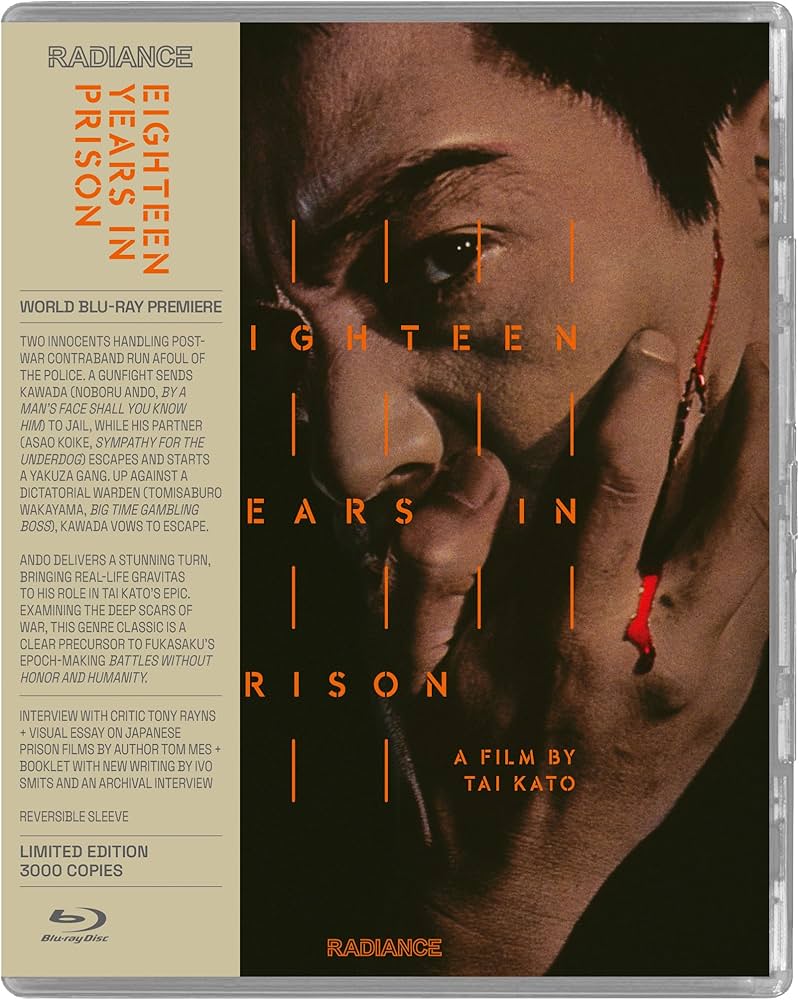Noboru Ando plays Kawada, a former soldier of a suicide squadron in WWII who is now trying to find meaning in his life and forms a gang with his friend Tsukada (Asao Koike) to steal goods from occupying American soldiers in order to setup an organization to take care of the families of fallen Japanese military men. They discover where a large cache of copper wire is that will fetch a pretty penny on the black market, but things go sideways and Kawada ends up getting arrested and thrown in prison while his partner Tsukada gets away with the copper, promising to use it for the destitute families as they planned. Unfortunately while wasting away in prison, Kawada discovers that Tsukada has instead used the money from the copper to start a yakuza gang and is now flourishing as a gang boss. This rightfully enrages Kawada, and he begins to plot his revenge for when he is released from prison.
Noboru Ando is remarkable here playing against type as a man battling against the forces of the yakuza, a person who at heart is a kind soul thrust into a situation that he can’t climb out of due to the dire circumstances of Japan post-WWII. For those aware, this film has a few auto-biographical touches for Ando, himself a former kamikaze squadron soldier in WWII who found himself adrift after the war, stumbling into a life of crime as the leader of a yakuza gang. While the excellent screenplay from future Battles Without Honor and Humanity scribe Kazuo Kasahara could have been shot as a somewhat traditional crime picture, director Tai Kato gives it a more impactful feel using stark lighting and askew angles to accentuate the claustrophobic feel of the prison walls. One gets a strong sense that Tsukada’s betrayal is more than just a personal slight but instead represents the feeling that the poor Japanese felt after being tossed aside and forgotten in the wake of the war, left to pick up the pieces of a nation in disarray.
Radiance has brought Eighteen Years to Prison to blu-ray courtesy of a hi-res digital file scanned in high definition by Toei Co. Ltd., and while it looks decent, the image overall comes across a bit soft with some of the high contrast lighting appearing overly harsh with the black levels appearing less saturated than they should be. I would honestly be surprised if this came from a negative. Some of this may be as a result of the cinematography of Osamu Furuya, who worked on many yakuza eiga during this time. His shooting style seems to be a bit at odds with Kato’s more noir-ish intentions in how the film is framed and directed. The audio provided is an uncompressed mono Japanese track and comes across clear with little sibilance or distortion in the mix. As always with Radiance, we have some nice and meaningful extras that help put the film in a fuller context. First we have a very useful appreciation by film critic Tony Rayns who goes into both Tai Kato’s and Noboru Ando’s history and what led them to work together on both Eighteen Years in Prison as well as their prior collaboration By a Man’s Face Shall You Know Him. The disc also includes a video essay by author/historian Tom Mes on the history of Japanese prison films, and it is also a great inclusion that helps provide more context on the film. Additionally, the film includes a physical booklet containing an essay by Tom Mes on post-war films of Japan by directors Kato, Kurosawa and Fukasaku as well as an interview by film critic Mark Schilling with Noboru Ando. Ando comes across as a no-nonsense guy that takes life as it comes and seems to have few regrets about his colorful past.
While the video quality is less than optimal with Radiance most likely being forced to use whatever Toei gave them, the very fact that we have gotten this forgotten gem that bridges the post-war era of Japan’s cinema with the more aggressive, bustling yakuza eiga of the ’70s is more than enough reason to justify this release and make it a necessary buy for anyone fascinated with this era of Japan’s filmmaking.

